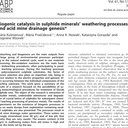Assessing quality of life during chemotherapy for pleural mesothelioma: feasibility, validity, and results of using the European Organization for Research and Treatment of Cancer Core Quality of Life Questionnaire and Lung Cancer Module.
کلید واژه ها
خلاصه
OBJECTIVE
To assess the feasibility and validity of using the European Organization for Research and Treatment of Cancer (EORTC) Core Quality of Life Questionnaire (QLQ-C30) and Lung Cancer Module (QLQ-LC13) to describe health-related quality of life (HRQL) in patients with pleural mesothelioma undergoing combination chemotherapy, to identify the most impaired aspects of HRQL, and to assess the impact of chemotherapy on HRQL.
METHODS
Fifty-three patients received cisplatin on day 1 and gemcitabine on days 1, 8, and 15 of a 28-day cycle for a maximum of six cycles. HRQL was assessed using the EORTC QLQ-C30 and QLQ-LC13.
RESULTS
Compliance was 100% at baseline but subsequently decreased. At baseline, role function and social function were the most impaired domains, and the worst-rated symptoms were fatigue, dyspnea, pain, insomnia, appetite loss, and cough. Dyspnea, pain, insomnia, and cough improved with chemotherapy, although functional domains and chemotherapy-related symptoms deteriorated. Fatigue remained unchanged. Few patients reported hemoptysis. Functional domains and symptoms scales from the QLQ-C30 demonstrated predictive validity for survival. The predictive value of QLQ-LC13 pain scores was improved by combining three pain items into a single score. Dyspnea scores were correlated strongly with lung function as measured by forced vital capacity.
CONCLUSIONS
This study supports the validity of the EORTC QLQ-C30 and LC13 as outcome measures for trials of chemotherapy in mesothelioma. Although the most prominent symptoms reported were concordant with clinical experience, impairments in role and social function and insomnia were worse than expected. Future research should focus on how best to apply, analyze, and interpret existing, validated HRQL instruments in mesothelioma research and practice, not on the development of new ones.



